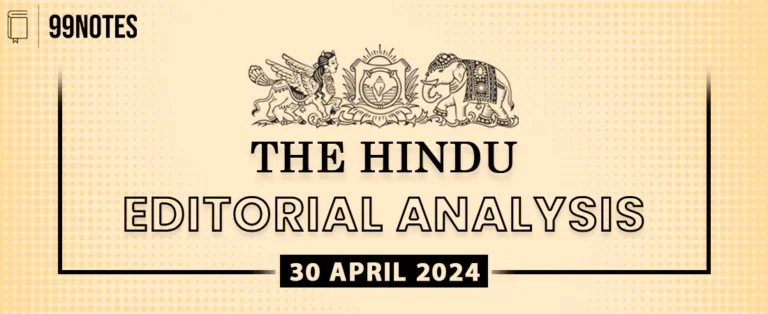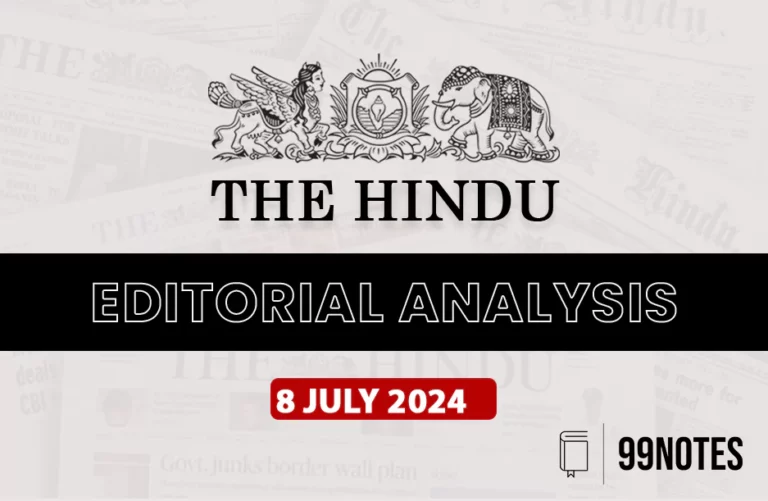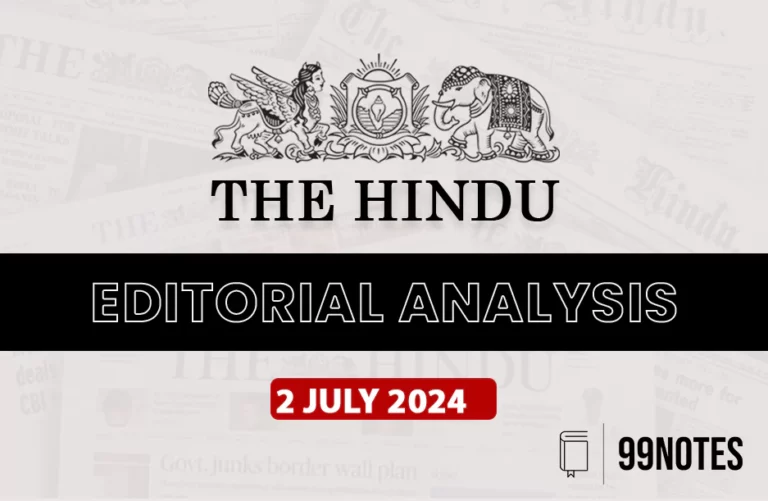16 February 2024 : The Hindu Editorial Notes PDF
The Hindu Editorial
16-February-2024
1. An intervention that will help strengthen legal education.
| Topic: GS2 – Social Justice – Education Crucial for UPSC aspirants: Highlights parliamentary committee recommendations to reform legal education, impacting governance, law, and justice sectors. |
| Context |
|
Introduction:
- Legal education in India historically overlooked compared to medicine and engineering.
- Positive changes began with the establishment of national law universities (NLUs) in the 1990s.
- NLUs led to increased opportunities for lawyers, both domestically and internationally.
Current Challenges:
- Many law schools, including NLUs, criticized for mediocrity and lack of focus on research.
- Only two Indian law schools ranked in the top 250 worldwide (Jindal Global Law School and National Law School of India University).
- Majority of law schools primarily focus on teaching, neglecting research.
Regulatory Changes:
- Recommendation to limit Bar Council of India’s (BCI) powers in regulating legal education.
- Proposal to establish an independent body, the National Council for Legal Education and Research (NCLER), to regulate non-litigation aspects of legal education.
- NCLER to include judges, practicing lawyers, and eminent law professors with a strong research background.
Emphasis on Research:
- Urgent need to prioritize and promote research in legal education.
- Recognition of poor research output, with India primarily consuming legal knowledge from the West.
- Call for recruiting “world-class global faculty” to strengthen research capabilities.
Funding for Research:
- There is a need for increased state funding to enhance the research ecosystem.
- Strengthening research seen as crucial for India’s law schools to thrive globally.
- It emphasizes necessity of complete academic freedom and autonomy.
Global Perspective:
- The article recognises of the impact of globalization on legal education.
- Recommendations include developing a global curriculum, promoting international exchange programs, integrating more international law courses, and exposing students to diverse legal systems.
Institutional Leadership:
- Call for passionate, charismatic, and visionary leaders in law faculties and universities.
- Critique of current leadership, emphasizing the importance of creating an enabling and supportive environment for academic excellence.
Call to Action:
- Recognition that legal education reform requires a collective effort from all stakeholders.
- Urgent need for higher education to become a top priority for comprehensive change.
Conclusion:
- The parliamentary committee’s recommendations provide a positive direction for improving the quality of legal education in India.
- Calls for collaborative efforts, visionary leadership, academic freedom, and increased funding to address current challenges and elevate legal education to global standards.
| PYQ: Do Department-related Parliamentary Standing Committees keep the administration on its toes and inspire reverence for parliamentary control? Evaluate the working of such committees with suitable examples. (250 words/15m)(UPSC CSE (M) GS-2 2021) |
| Practice Question: What are the key recommendations of the parliamentary committee to reform legal education in India, and why are they significant? (150 words/10 m) |
2. The electoral bonds verdict is a blow for freedom of expression.
| Topic: GS2 – Governance – Important aspects of governance: Transparency and accountability GS2 – Polity – Judiciary Critical for UPSC aspirants: Supreme Court’s Electoral Bond Scheme verdict addresses governance transparency, protecting voters’ rights, and political funding issues. |
| Context |
|
Background: Electoral Bond Scheme (EBS)
- The Electoral Bond Scheme allowed individuals to buy electoral bonds and donate them to political parties for encashment.
- The scheme aimed to curb the use of ‘black money’ for political or electoral funding by facilitating donations through banking channels.
Supreme Court Judgment: Striking Down the Electoral Bond Scheme
- The Supreme Court of India declared the entire Electoral Bond Scheme as unconstitutional.
- Emphasized the violation of the Constitution, specifically the voters’ right to information.
- Found the scheme to be manifestly arbitrary, pointing to the amendment in the Companies Act that removed the cap on corporate donations without disclosure requirements.
Key Findings and Rationale of the Supreme Court:
Proportionality Test:
- The primary justification for the EBS, curbing ‘black money,’ failed the test of proportionality.
- The scheme was not the least restrictive measure to abridge the voters’ right to know.
Corporate Donations and Policy Decisions:
- Established a logical connection between unidentified corporate donations and the potential influence on policy decisions.
- Highlighted the risk of tailored policy decisions to suit corporate donors.
Extension of Freedom of Expression Principle:
- Extended the principle that voters’ freedom of expression under Article 19(1)(a) is incomplete without access to information on a candidate’s background.
- Applied this principle to reveal corporate donors funding ruling parties.
Additional Observations and Mandates:
- Found the amendment to the Companies Act allowing unlimited corporate donations without disclosure as manifestly arbitrary.
- Mandated disclosure of donation details since 2019, promoting transparency in political funding.
- The judgment aligns with previous Supreme Court interventions, such as introducing the ‘None of the Above’ option, removing protection for legislators on immediate disqualification for criminal offenses, and mandatory disclosure of candidates’ assets and criminal antecedents.
Critical Reflections and Unanswered Questions:
- Questioned the timing of the judgment and whether an interim stay on the scheme could have been granted earlier.
- Raised concerns about the potential impact of the thousands of crores given to parties under the scheme on policy measures and additional campaign resources, which may never be fully known.
Conclusion:
- The Supreme Court’s decision is seen as a significant step towards promoting democracy, transparency, and voter rights in India’s electoral process.
- The judgment may help reduce the influence of donors on governance through money power.
| PYQ: To enhance the quality of democracy in India the Election Commission of India has proposed electoral reforms in 2016. What are the suggested reforms and how far are they significant to make democracy successful? (250 words/15m) (UPSC CSE (M) GS-2 2017) |
| Practice Question: In light of the recent Supreme Court verdict on the Electoral Bond Scheme, discuss its significance in upholding transparency in political funding and preserving democratic principles in India. (250 words/15 m) |
For Enquiry

16 February 2024 : The Hindu Editorial Notes PDF

16 Feb 2024 : Indian Express Editorial Analysis

16 February 2024 : PIB Summary for UPSC

Kurukshetra Magazine Summary December 2023: Self-Reliant Villages

Kurukshetra Magazine Summary November 2023- Talent In Rural India

Kurukshetra Magazine Summary October 2023: Clean And Green Villages

15 Feb 2024 : Daily Current Affairs Quiz

15 Feb 2024 : Daily Answer Writing

15 Feb 2024 : Daily Current Affairs

15 Feb 2024 : Indian Express Editorial Analysis
Feb 2024 The Hindu 16 February 2024 : The Hindu Editorial Notes PDF The Hindu Editorial
15-February-2024
1. A demand that could hamper gender equality
Topic: GS2 –…
Indian Express 16 Feb 2024 : Indian Express Editorial Analysis Indian Express Editorial Analysis
16-February-2024
1. Democracy’s guardian angel
Topic: GS2 – Governance…
feb 2024 PIB 16 February 2024 : PIB Summary for UPSC PIB Summary for UPSC
16-February -2024
1. India needs Rs. 30 lakh crores investment during FY 2024-2030…
Kurukshetra Summary Kurukshetra Magazine Summary December 2023: Self-Reliant Villages Kurukshetra Magazine December 2023 Summary
1.Towards Making Villages Self-Reliant: Role of Ministry of…
Kurukshetra Summary Kurukshetra Magazine Summary November 2023- Talent In Rural India Kurukshetra Magazine November 2023 Summary
1.NURTURING SPORTS TALENT IN RURAL INDIA.
Sports in Rural…
Kurukshetra Summary Kurukshetra Magazine Summary October 2023: Clean And Green Villages Kurukshetra Magazine October 2024 Summary
1. VISION FOR GREEN AND CLEAN RURAL INDIA.
Introduction:
India…
Daily Quiz 15 Feb 2024 : Daily Current Affairs Quiz 15 Feb 2024 : Daily Quiz…
mains answer writing 15 Feb 2024 : Daily Answer Writing Mains Answer Writing
15-February-2024
Q1) The issues of local self-governance are primarily the issues…
Daily Current Affairs 15 Feb 2024 : Daily Current Affairs Daily Current Affairs
15-February-2024- Top News of the Day
1. Economic Realities Clash with Political…
Indian Express 15 Feb 2024 : Indian Express Editorial Analysis Indian Express Editorial Analysis
15-February-2024
1. The new echo system
Topic: GS4 – Public/Civil…






